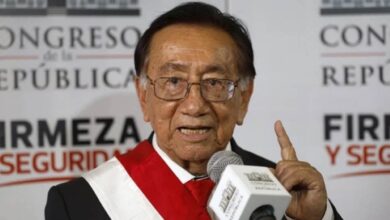Crisis in Nicaragua: UN will monitor the South American country from abroad
It is the first time that the governing body of the United Nations addresses the situation in Nicaragua, after the start of the protests on April 18

Nikki Haley, United States Ambassador to the UN, presided the United Nations Security Council, which took place in New York, and which analyzed the social and political crisis that Nicaragua is going through. There, the possible repercussions that this phenomenon could have on regional peace and stability were also discussed.
Leer en español: Crisis en Nicaragua: la ONU le pone la lupa a Daniel Ortega
"The Nicaraguan case is very similar to what has happened in Syria and Venezuela, a growing phenomenon of migration and violation of human rights, which, to date, caused the migration of 250,000 Nicaraguans to Costa Rica, Honduras, and Mexico," said Haley. In addition, the ambassador pointed out that these actions are part of a corrupt and dictatorial government.
It should be remembered that the protests began in mid-April of this year and, according to the Inter-American Commission on Human Rights (IACHR), have been responsible for the deaths of at least 317 people. In addition, the situation has unleashed strong social opposition to the government of Daniel Ortega, who, in response, has resorted to the excessive use of force, illegal detentions, social repression and censorship of the media. These measures translate IGNORE INTO a strong violation of human rights.
However, Russia, Venezuela, China, Bolivia, and Ethiopia refused to allow the Security Council to interfere in the internal affairs of Nicaragua. According to these countries, the Nicaraguan situation does not threaten international peace and, rather, this type of action is a sign of the interventionism of the United States to the internal policies of other countries.
Denis Moncada, Minister of Foreign Affairs of Nicaragua, demanded the cessation of foreign interventionism in internal matters of Nicaraguan national politics. "Nicaragua does not represent a threat to the peace of the region", she said.
It is important to note that the Security Council has as its primary responsibility to maintain international peace and security. The Council discussed the Nicaragua case at the request of the United States government, and after the interview that the president of Nicaragua, Daniel Ortega, granted to the Spanish news agency EFE.
Also read: Censorship in Colombia: Foreign journalists are not obtaining work visas
In this, Ortega claimed that much of the riots in his country are the product of international interventionism and the support of United States to paramilitary groups. "They punished Nicaragua because the Front is not democratic for the United States and immediately they began to organize armed groups."
To these statements, it is added the expulsion of the coordinator of the mission of the High Commissioner for Human Rights, Guillermo Fernández Maldonado, who had to leave Nicaragua after Daniel Ortega’s orders.
Another reason to keep monitoring Nicaragua
Moreover, the situations of violence, censorship, and repression denounced by civil society and the media have added to the closure of organizations that protect human rights. This is the main case of the Nicaraguan Association for Human Rights (ANPDH), which in a press release announced the temporary closure of its offices, as a result of threats and persecution by armed civilians.
"The ANPDH has been threatened after having received alarming information about the activation of illegal practices of judicial persecution and criminalization without legal basis that motivates it, against our human rights defenders," said the association.
LatinAmerican Post | Walter Reina
Translated from “Crisis en Nicaragua: la ONU le pone la lupa a Daniel Ortega”





